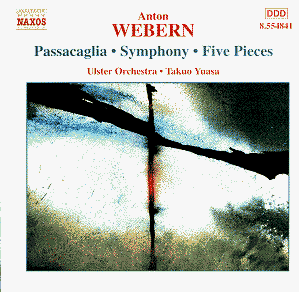 Composer: Anton Webern
Composer: Anton Webern
Works: Passacaglia, Opus 1; Five Movements for Strings, Opus 5; Six Pieces, Opus 6; Five Pieces, Opus 10; Symphony, Opus 21; Variations, Opus 30
Performers: Ulster Orchestra; Takuo Yuasa, conductor
Recording: 29-30 March 2000, Ulster Hall, Belfast
Label: NAXOS 8.554841 [52.27]
Anton Webern, a pivotal figure in the development of 20th-century music, is renowned for his rigorous exploration of atonality and serialism. An early protégé of Arnold Schoenberg, Webern’s compositional evolution from lush romanticism to the stark austerity of his later works is captured in this enterprising Naxos release. The program spans his career, showcasing both the lush textures of his early Passacaglia and the radical brevity of his later pieces. This juxtaposition provides a compelling lens through which to appreciate Webern’s trajectory and the profound impact he had on subsequent generations of composers.
The Ulster Orchestra, under the deft direction of Takuo Yuasa, delivers a nuanced performance that emphasizes the delicacy and precision inherent in Webern’s music. The recording quality is commendable, with the ambient acoustics of the Ulster Hall enhancing the orchestra’s sonority while allowing for clarity of individual lines. The opening Passacaglia, with its rich string textures, draws upon the lush, expressive qualities reminiscent of Mahler, yet it foreshadows the composer’s later turn towards the economy of the serial language. Yuasa’s interpretation highlights the arching melodic lines and dynamic contrasts, effectively setting the emotional tone for the subsequent works.
As the disc progresses, the transition from the romanticism of the Passacaglia to the iconoclastic language of the later pieces is handled with remarkable finesse. The Five Movements for Strings, Opus 5, exemplifies Webern’s early atonal style, its fragmented motifs demanding meticulous execution. Here, the orchestra’s technical prowess shines through, particularly in the way the players navigate the intricate counterpoint and sonorous textures. The Symphony, Opus 21, presents a stark contrast with its rigorous adherence to serial principles. Yuasa achieves a remarkable balance, allowing the clarity of the orchestration to emerge even in the most complex passages, a testament to both the orchestra’s skill and the effectiveness of the recording’s engineering.
One of the standout moments of this recording is the funeral march from the Six Pieces, Opus 6. This brief but profoundly expressive movement encapsulates the emotional weight of Webern’s music, with its increasing intensity creating an overwhelming sense of gravitas. While the famous recordings by Herbert von Karajan and the Berlin Philharmonic may offer a more polished interpretation, Yuasa and the Ulster Orchestra present a wholly convincing performance that stands on its own merit. Their ability to convey the nuanced emotional landscape of Webern’s music is commendable, allowing listeners to experience the depth and complexity of the composer’s vision.
Takuo Yuasa’s interpretations, combined with the Ulster Orchestra’s adeptness, result in a compelling portrait of Webern’s oeuvre. The thorough and perceptive liner notes by Richard Whitehouse further enhance the listener’s understanding of the historical and musical contexts of these works. This disc not only serves as an excellent introduction to Webern for newcomers but also as a valuable addition to the collections of seasoned listeners. The Ulster Orchestra’s commitment to clarity and expression offers a refreshing perspective on Webern’s challenging, yet rewarding, music.



